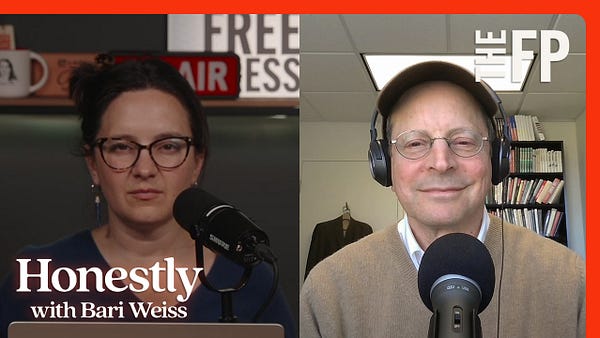
Say the name “Oliver Burkeman” in The Free Press office, and more than one person will say: “He changed my life.”
In 2021, the Brooklyn-based Brit published a book called Four Thousand Weeks: Time Management for Mortals, which starts with a bleak but indisputable fact: “The average human lifespan is absurdly, terrifyingly, insultingly short.” (If you live to be 80, you’ll have about 4,000 weeks on Earth.) So, it might surprise you to learn that Four Thousand Weeks—which became a bestseller on both sides of the Atlantic—is not a depressing treatise about the meaninglessness of life; it’s actually a profoundly empowering guide to making the most of the time that you’ve got.
And—spoiler—it’s not about doing more with it.
This claim sounds radical in an age in which self-help books tell us the key to happiness is to wake up at 5 a.m. for a dance workout, and social media bombards us with ideas about how to #OptimizeYourLife. (Why does it always involve juice?) Oliver himself is a recovering “productivity geek,” a man who has tried every trendy new method to cram more and more tasks into his limited days—from apps with names like Braintoss to hacks like the Pomodoro Technique. “Few things feel more basic to my experience of adulthood than the vague sense that I’m falling behind, and need to do more,” he admits in today’s essay.
Eventually, he discovered that life starts when you accept there’s only so much you can do.
It’s a philosophy he’s named “Imperfectionism,” and we were so excited when we heard he was writing a whole new book on it. Meditations for Mortals—which came out Tuesday—is “about how the world opens up once you realize you’re never going to sort your life out, when you give up the grim-faced quest to make yourself more and more productive.” And it’s exactly what Americans—44 percent of whom feel burned out by the demands of modern life—need to hear.
So, we’re delighted to bring you an excerpt of Oliver’s book today. In it, he explains how the drive to keep doing more erodes our “aliveness,” and argues that “a fulfilling and accomplished life isn’t a matter of exerting ever more control.”
Oh, and he also tells the story of the time he asked Jerry Seinfeld about productivity. (“It’s so dumb,” was Jerry’s verdict.)
May he inspire you to do very little this weekend! — Freya Sanders
In my late twenties, I started working as a general feature writer at The Guardian newspaper in London. Often, upon arriving at the office in the morning, I would be assigned some topic currently in the news—the fate of refugees fleeing an unfolding geopolitical crisis, say, or why green smoothies were suddenly so popular. My job was to turn in a big-picture, intelligent-seeming, 2,000-word article on that topic, by 5 p.m. the same day.
My days were shot through with the feeling of being on the back foot, fighting against time, and needing to buckle down immediately, if I were to stand any chance of closing the gap. Indeed, few things feel more basic to my experience of adulthood than the vague sense that I’m falling behind, and need to do more, if I’m to stave off an ill-defined catastrophe that might otherwise come crashing down upon my head.
Sometimes, it felt like all I needed was a bit more discipline; at other times, I was sure the answer lay in a new system for managing my tasks and goals, which I’d track down just as soon as I got this article on smoothies out of the way. I devoured self-help books, tried meditation, and explored Stoicism, growing slightly more anxious each time another new technique proved not to be the silver bullet.
Always over the horizon, meanwhile, hovered the fantasy of one day “getting on top of things”—where “things” could mean anything from emptying my inbox to figuring out how romantic relationships were supposed to work—so that the truly meaningful part of life, the really real part, could finally begin.
I know now, though I didn’t back then, that I’m not alone. Since 2021, when I published a book about the challenge of using time well, hundreds of people have told me they share this feeling. Younger people I’ve encountered seemed utterly daunted by the task of getting life into working order, while many older ones were dismayed that by 40 or 50 they apparently still hadn’t managed it, and were starting to wonder if they ever would.
But my conversations helped me recognize a deeper issue, too, which is the way our ceaseless efforts to get into the driver’s seat of life seem to sap it of the very sense of aliveness that makes it worth living in the first place. For all our efforts to get more done, we find ourselves somehow less able to bring about the results we were seeking.
It happens even when you succeed in following the rules you set for yourself, to make you more productive.
You manage to make yourself meditate daily, and suddenly it feels soul-crushingly boring to do so; or you get around to organizing a date night with your spouse—because everyone says that’s how to keep the spark alive—but the whole thing makes the two of you so self-conscious that it’s fated to descend into bickering, and you end the evening feeling like failures.
In my days as a “productivity geek,” I was always embracing some new system for designing my life, and as I downloaded the relevant app, or purchased the required stationery, I’d feel excited, even intoxicated: I was on the verge of great things!
Then, within a day or two, my new schedule would seem dismal and lifeless, another list of chores I had to slog through, and I’d find myself angrily resenting the jerk dictating that I must spend my time in this manner—even though the jerk in question was me.
This loss of aliveness helps explain the epidemic of burnout, which isn’t merely a matter of exhaustion, but of the emptiness that comes from years of pushing oneself, machine-like, to do more and more, without it ever feeling like enough.
A decade ago, I got the chance to interview Jerry Seinfeld, and so, naturally, I asked him about the “Seinfeld Strategy”—the amazing productivity secret that supposedly explained his prolific joke-writing and global success.















